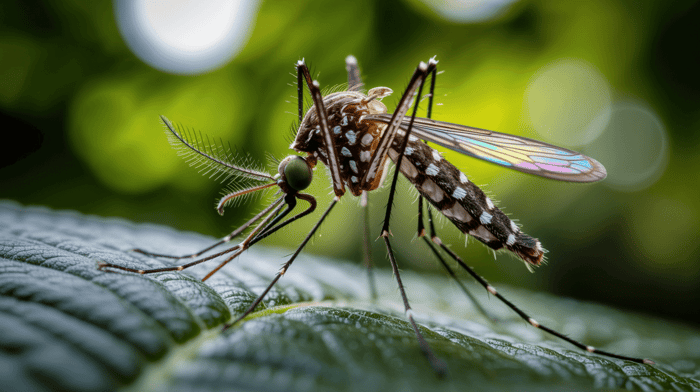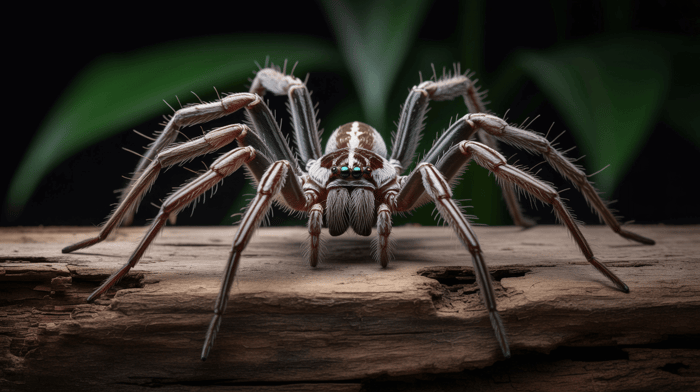Table of Contents
- At a glance -
- Bug Bite Causing Migraine? Here's What to Know
- Bugs Most Likely to Trigger Neurological Symptoms
- The Science Behind Bug Bite-Triggered Migraine
- Recognizing Serious Reactions & When to Worry
- Got questions?
- Can the use of ice packs help manage migraine triggered by bug bites?
- How do female mosquitoes specifically contribute to migraine triggers?
- What's the connection between tick bites, joint pain, and migraine?
- How do black widow spider bites affect the nervous system to trigger migraine?
- What role do lymph nodes play when a bug bite triggers a migraine?
- How effective is hydrocortisone cream in managing bite-related migraine?
- What's the relationship between bee stings, toxic reactions, and migraine?
- When do itchy bites and itchy skin escalate to a neurological problem?
- What's the proper way to clean a bug bite site to minimize migraine risk?
- What makes wasp stings particularly problematic for migraine sufferers?
- Final Thoughts on Bites, Brains, and Migraine
At a glance -
|
That innocent mosquito bite on your arm, the one you're absently scratching while reading this, could it really trigger your next debilitating migraine?
For most people, bug bites are merely annoying, but for others, they're the first domino in a cascade of neurological events that ends in throbbing head pain, nausea, and sensitivity to light.
Whether it's the immune system overreacting, pathogens hitching a ride into your bloodstream, or venom affecting your nervous system, the relationship between bugs and your brain is more complex than you might think.

If you've ever wondered why your camping trip ended with two days in a dark room and a cold compress, or if you're simply curious about this strange mind-body connection, read on.
Understanding how these tiny irritations can escalate to neurological symptoms might just help you prevent your next migraine, or help you recognize when that post-bite headache calls for a trip to the doctor.
If you’ve ever suspected a bug bite causing migraine symptoms, you’re not alone — in some sensitive individuals, the immune and nervous system responses to insect bites may play a role.
Bug Bite Causing Migraine? Here's What to Know
That itchy red bump from a mosquito might seem harmless, but for some people, it can spiral into a full-blown migraine.
Why does this happen? The answer lies in how our bodies react to foreign substances and how certain insects can trigger neurological chaos.
Let's unpack the fascinating (and sometimes alarming) connection between bug bites and your brain.
The Immune Response to Bug Bites
When an insect bites, it injects saliva into your skin to help keep the blood flowing. This saliva contains specialized proteins designed to stop your blood from clotting and to make feeding easier.
Your body recognizes these foreign proteins as a threat and launches an immune response. That’s why you get redness, swelling, and itching at the bite site.
In most cases, the reaction stays local. But sometimes, it spreads throughout the body. This is called a systemic reaction, and it can include symptoms like headaches or even migraine.
What Actually Enters Your Body When a Bug Bites You
A bug’s bite might seem minor, but more than just a sting or itch is happening beneath the surface. Here are some of the things that could be introduced into your body following a bite:
Insect saliva – contains proteins, enzymes, and anticoagulants (which stop your blood from clotting)
Pathogens – some insects carry viruses, bacteria, or parasites that can enter through the bite
Venom – especially from certain spiders and stinging insects; this can affect your nerves or immune system
Each of these can trigger a different kind of reaction, depending on how your body responds. For some people, even saliva alone is enough to set off a strong immune response. In others, it’s the infection or venom that causes symptoms to escalate.
Some people react more strongly to bug bites than others. The table below shows a few of the reasons why:
Risk Factor | Impact on Reaction Severity |
Prior exposure | Sensitization can increase reaction intensity |
Allergies | People with allergies often react more strongly |
Age | Children and elderly may have stronger reactions |
Genetics | Some people are genetically predisposed to severe reactions |
When Swelling and Itching Escalate Into a Migraine
In some people, a bug bite doesn’t stop at the itching. It sets off a chain reaction that ends in migraine. Here’s how the process usually unfolds:
The immune system responds to the bite
Inflammatory chemicals are released, causing redness and swelling
Blood vessels expand in a process called vasodilation; this can increase pressure in the head
Pain-sensitive nerves get activated, sending warning signals to the brain
Migraine pathways switch on, especially in people already prone to them
Not everyone will go through this chain of events, but for those with a sensitive immune system or a history of migraine, the body’s overreaction can be enough to trigger symptoms.
This wave of immune activity, sometimes called an inflammatory cascade, is what links a small bite to something much bigger, a potential migraine.
For those who experience this type of cascade, some find that targeted nutritional support, such as magnesium and riboflavin, may play a role in migraine management when used consistently under medical guidance. Learn how the medical food Brain Ritual® supports the dietary management of migraine.
Disclaimer: Brain Ritual® is a medical food intended for the dietary management of migraine under medical supervision. It is not intended to diagnose, treat, cure, or prevent any disease. Always consult your healthcare provider before making changes to your diet or supplement routine.
Bugs Most Likely to Trigger Neurological Symptoms
Not all bugs carry the same risk when it comes to potentially triggering migraine.
Some insects carry diseases that can directly affect your nervous system, whilst others inject substances that may spark a chain reaction in your body, leading to head pain.
Knowing which insects pose the biggest threat can help you take the right precautions and be better prepared to respond if symptoms appear.
Mosquitoes
Mosquito bites are common and usually result in mild reactions.

Certain mosquitoes carry viruses such as West Nile and Zika; these can affect your nervous system and trigger symptoms such as headaches or migraine. In rare cases, these infections may lead to encephalitis, which is inflammation of the brain. This can cause severe headache, fever, and confusion.
West Nile virus can lead to neuroinvasive disease in fewer than 1 in 100 infected people
Symptoms may appear 2 to 14 days after being bitten
Early signs of mosquito-borne illness include fever, headache, and body aches
It’s also important to know the difference between a bad migraine and something more serious, like an aneurysm or meningitis. If in any doubt, it’s worth getting checked out.
Ticks
Ticks are well-known carriers of Lyme disease, which can lead to a range of symptoms, including severe headaches and, in some cases, migraine.
The disease often begins with a distinctive bull’s-eye rash and flu-like symptoms. If not treated early, it can develop into more serious neurological problems.
Ticks usually need to be attached for 36 to 48 hours to transmit Lyme disease
Early symptoms may include fatigue, fever, and headache
Later symptoms can include severe headaches, neck stiffness, and nerve-related issues
If you notice any of these signs after a tick bite, it’s important to seek medical advice as soon as possible. Early treatment can prevent long-term complications.
Spider
Most spider bites are harmless, but a few species such as the black widow and brown recluse can cause more serious problems.

Their venom may lead to muscle pain, cramping, and in some cases, severe headaches. While rare, some bites may cause a wider immune reaction that affects the nervous system.
One reported case involved a person developing complex neurological symptoms a few days after a spider bite. The condition was identified as acute disseminated encephalomyelitis (ADEM), a rare inflammation of the brain and spinal cord. Symptoms included headache, drowsiness, confusion, speech problems, and loss of coordination. Researchers suggested this might have been caused by the immune system reacting to spider venom in a way that also affected the brain.
If you experience unusual symptoms after a spider bite, especially ones involving your head, speech, or movement, it’s important to seek medical help right away.
Spider Type | Venom Effects | Migraine Connection |
Black Widow | Neurotoxic, affects nervous system | Can cause severe headaches and cranial pressure |
Brown Recluse | Cytotoxic, destroys tissue | Systemic reaction may trigger headaches |
Tarantula | Usually mild, but can cause allergic reactions | Severe allergic reactions may include headaches |
NB: Headache and migraine symptoms are rare and not guaranteed. This table reflects occasional reports, not established causation.
The Science Behind Bug Bite-Triggered Migraine
The mechanisms linking insect bites to migraine involve the immune system, the nervous system, and sometimes pathogens introduced during the bite. These systems may interact in ways that can trigger neurological symptoms in susceptible individuals.
Mechanisms Linking Bug Bites to Migraine
When insect saliva enters the body, the immune system responds by releasing histamine and other inflammatory mediators. In some people, this response may influence neurological pathways involved in migraine.
Histamine dilates blood vessels, potentially activating migraine pathways
Pro-inflammatory cytokines can increase pain sensitivity
Mast cell activation can contribute to neurogenic inflammation
The immune response may also raise oxidative stress levels in the body
Transmission of Neurotropic Pathogens
Some insects transmit viruses, bacteria, or parasites that specifically target the nervous system. These infections may mimic or contribute to migraine-like symptoms.
Certain viruses, such as West Nile, have an affinity for nerve tissue
Bacterial toxins can interfere with neurotransmitter signaling
Parasitic infections may lead to inflammation in or around the brain
Allergic Reactions
Although rare, severe allergic reactions to insect bites can result in systemic inflammation, which may include headache and migraine-like symptoms. These reactions can be life-threatening and require immediate medical attention.
Recognizing Serious Reactions & When to Worry
Not every headache after a bug bite is cause for concern, but sometimes it’s a warning sign you shouldn’t ignore.
Knowing the difference between a normal reaction and something more serious could literally save your life.
Could It Be More Than a Migraine? What to Watch For
Most insect bites are harmless and clear up on their own. But if you experience any of the symptoms below, it’s important to seek medical advice:
Severe or persistent headaches following a bug bite
Fever, chills, or flu-like symptoms
Neurological signs such as confusion, weakness, or numbness
Signs of infection at the bite site, such as increased redness, swelling, or pus
A developing rash, especially a bull’s-eye pattern
If any of these symptoms occur, it's essential to consult a healthcare provider promptly.
The table below shows when it’s generally safe to manage symptoms at home and when it’s important to seek medical advice.
Symptom | Home Management OK | See a Doctor |
Mild headache with local swelling | ✓ | |
Severe headache with fever | ✓ | |
Small area of redness (<2 inches) | ✓ | |
Expanding rash or bull's-eye pattern | ✓ | |
Mild itching and discomfort | ✓ | |
Confusion, dizziness, or vomiting | ✓ | |
Bite site improves within 24-48 hours | ✓ | |
Bite site worsens after 48 hours | ✓ |
Best Ways to Protect Yourself from Bites that May Lead to Migraine
Proactive habits can help reduce your exposure to common bite-related triggers. Here are some practical ways to reduce your risk:
Repellent strategies
Apply permethrin to clothing to help deter insects, especially in high-risk areas
Consider natural options like oil of lemon eucalyptus, especially if you have sensitive skin
Use insect repellents containing DEET or picaridin, but take care if you have allergies or are sensitive to chemical exposure
Environmental protection
Wear protective clothing in areas with high insect activity
Make sure windows and doors are properly screened
Eliminate standing water to reduce mosquito breeding grounds
Check your body for ticks after spending time outdoors
Medical preparation
Talk to your healthcare provider about whether antihistamines may be appropriate if you’re prone to strong reactions
Talk to your doctor about preventative strategies if you’ve had serious reactions in the past
Consider allergy testing if you suspect you’re sensitive to insect bites
Topical solutions help, but for people with migraine sensitivity, internal support through nutrition may also make a difference. Brain Ritual® was developed to support the dietary management of migraine, using ingredients like magnesium, riboflavin, selenium, and zinc in clinically backed forms chosen for their clinically supported roles in immune balance, oxidative stress reduction, and neurological health. |
Got questions?
Below are answers to some of the most common concerns people have about bug bites and migraine.
In this section, we'll address common concerns about the relationship between bug bites and migraine. These questions represent the most frequently asked by people experiencing headaches after insect encounters.
Can the use of ice packs help manage migraine triggered by bug bites?
Absolutely. Ice packs can be a helpful first step for both the local reaction to a bug bite and the subsequent migraine.
When applied to the bite site, cold therapy helps reduce inflammation and swelling by constricting blood vessels, potentially interrupting the inflammatory cascade that leads to migraine.
For active migraine, applying a cold pack to the forehead, neck, or scalp can help numb the area and may reduce the throbbing pain and inflammation associated with migraine headaches.
Aim for 15-20 minute applications, take breaks in between to avoid skin irritation or damage.
How do female mosquitoes specifically contribute to migraine triggers?
Female mosquitoes pose a unique risk for migraine sufferers because they're the only ones that bite humans, requiring blood meals for egg production.
Their saliva contains more than 100 proteins that can trigger immune responses in humans.
For migraine-prone individuals, this protein cocktail may initiate inflammatory cascades that affect neurological pathways.
Furthermore, female mosquitoes from certain species like Aedes aegypti and Anopheles are vectors for neurotropic pathogens that cause dengue fever and yellow fever, which can present with severe headaches that may mimic or trigger genuine migraine.
People with sensitized immune systems should be particularly cautious during peak mosquito season.
What's the connection between tick bites, joint pain, and migraine?
Tick bites can lead to infections like Lyme disease, which may cause symptoms such as joint pain, a skin rash, and, in some individuals, migraine-like headaches. This connection exists because the Borrelia bacteria transmitted through tick bites can spread throughout the body, affecting both the nervous system and joints.
The inflammatory response triggered by these bacteria can activate pain pathways in the brain, potentially causing severe migraine.
Additionally, the joint pain itself can become a secondary migraine trigger due to overall bodily stress and discomfort.
If you experience migraine accompanied by joint pain after a tick bite, especially with an expanding bull's-eye rash, it's crucial to seek immediate medical attention as early antibiotic protocol is essential.
How do black widow spider bites affect the nervous system to trigger migraine?
Black widow spider venom contains alpha-latrotoxin, a powerful neurotoxin that causes a massive release of brain signaling chemicals, overwhelming the nervous system, which may contribute to neurological symptoms.
This can result in intense pain, abdominal cramping, and severe headaches, which may resemble or trigger migraines in some individuals.
The venom’s effects on blood pressure and autonomic nervous system regulation can further contribute to headache symptoms.
Unlike many insect bites, black widow venom directly impacts the nervous system, potentially creating a more direct link between the bite and neurological symptoms.
Victims often experience radiating pain from the bite site followed by systemic symptoms, including severe headache. Immediate medical attention is crucial, as antivenom or supportive care may be necessary to manage symptoms and prevent complications.
What role do lymph nodes play when a bug bite triggers a migraine?
Swollen or tender lymph nodes after a bug bite indicate your immune system is actively responding to either the bite itself or a transmitted pathogen.
This immune activation releases cytokines and other inflammatory mediators that can cross the blood-brain barrier and trigger neuroinflammation.
For migraine-prone individuals, this inflammatory cascade may activate the trigeminovascular system, potentially triggering migraine-like symptoms.
Additionally, certain insect-transmitted infections like Lyme disease or arboviral infections specifically cause lymphadenopathy (swollen lymph nodes) along with neurological symptoms including migraine.
If you notice swollen lymph nodes accompanied by headaches following a bug bite, this suggests a systemic reaction that warrants medical evaluation.
How effective is hydrocortisone cream in managing bite-related migraine?
Hydrocortisone cream may help manage the inflammatory response that sometimes links a bug bite to migraine symptoms, especially if applied promptly.
This over-the-counter steroid cream works by suppressing the local inflammatory response at the bite site, potentially interrupting the cascade of inflammatory mediators that can trigger a migraine.
The cream works best when applied at the first sign of itchy bumps or skin irritation from bites.
However, it's important to understand that while hydrocortisone may help manage the progression from bite to migraine, but it is not intended to treat an established migraine once it begins.
For those with known sensitivity to insect bites, keeping hydrocortisone cream readily available during outdoor activities can be a proactive strategy for migraine support.
What's the relationship between bee stings, toxic reactions, and migraine?
Bee stings involve the injection of venom containing enzymes, peptides, and amines. These substances can cause local inflammation and, in some individuals, a broader immune response.
In rare cases, this venom may trigger symptoms beyond a typical allergic reaction, including headaches or migraine. This could be due to its effects on nerve endings, blood vessels, and the release of histamine.
Even without a strong allergic reaction, the stress and pain of a bee sting can be enough to trigger a migraine in people who are sensitive.
While most concerns focus on the risk of anaphylaxis, it’s also important to know that bee stings may act as a migraine trigger. This is particularly true when multiple stings occur, increasing the amount of venom and the body’s inflammatory response.
When do itchy bites and itchy skin escalate to a neurological problem?
Persistent itchy bites can create a problematic cycle where scratching damages the skin, potentially leading to bacterial infection that further amplifies the body's inflammatory response.
This sustained inflammation can activate neurological pathways, especially in migraine-prone individuals.
The transition from simple itchy skin to neurological involvement often involves signs like spreading redness beyond the bite site, unusual patterns of itchy rashes rather than isolated bumps, headaches that worsen when touching the bite area, or cognitive symptoms like brain fog appearing after intense itching episodes.
Breaking this cycle requires both treating the skin with appropriate anti-itch medications and sometimes taking oral antihistamines to reduce the systemic inflammatory response before it potentially contributes to neurological symptoms.
What's the proper way to clean a bug bite site to minimize migraine risk?
Properly cleaning the skin with soap and water within minutes of a bite may help reduce the chance of migraine-like symptoms following a bite by removing residual insect saliva proteins that trigger immune responses.
Use unscented mild soap and lukewarm water, washing gently for at least 20 seconds without scrubbing, which could spread venom or irritants.
For bites from disease-carrying insects like ticks, cleansing with antiseptic solutions containing chlorhexidine may provide additional protection against pathogens that could cause neurological symptoms.
Avoid applying alcohol directly to bites, as this can increase inflammation and skin irritation, potentially worsening the cascade that leads to migraine.
After cleaning, applying a cold pack rather than scratching can further reduce the local inflammatory response.
What makes wasp stings particularly problematic for migraine sufferers?
Wasp stings may pose increased risks for migraine sufferers due to the biological effects of wasp venom and the body's stress response to the sting.
Wasp venom contains peptides and other compounds that can trigger inflammation, pain, and histamine release, which may indirectly contribute to a migraine in some individuals.
Additionally, the intense pain from a wasp sting can activate the body's stress response, releasing catecholamines like adrenaline, which are known migraine triggers for some people.
Unlike bees, wasps can sting multiple times, increasing the venom load and magnifying these effects. While there is no direct evidence that wasp venom itself triggers migraines, the combination of pain, stress, and inflammatory responses may provoke migraines in those who are already predisposed.
Migraine sufferers should take preventive measures to avoid wasp stings and carry over-the-counter pain relievers or prescribed migraine medications as a precaution during wasp-active seasons.
Final Thoughts on Bites, Brains, and Migraine
Most bites will only cause a brief discomfort. But for some people, the immune response they trigger can set off a chain reaction that leads to migraine.
Understanding this connection empowers you to take proactive measures, such as using appropriate repellents, promptly treating bites, and recognizing warning signs that warrant medical attention.
For those living with migraine sensitivity, this insight is more than just knowledge. It offers practical tools to interrupt the bite-to-migraine pathway.
As research continues to uncover how these tiny irritations connect to significant neurological events, one thing remains clear: in the complex relationship between bug bites and the brain, awareness and management are our best allies.
If you’re exploring ways to reduce your migraine risk more holistically, especially in response to known triggers like bug bites, nutritional strategies may offer additional support. For those looking for a more structured nutritional approach, Brain Ritual® was developed by an Oxford-trained neuroscientist for the dietary management of migraine, under medical supervision. It’s designed to simplify your routine with science-backed ingredients in a thoughtfully designed formula that fits easily into your daily routine.




